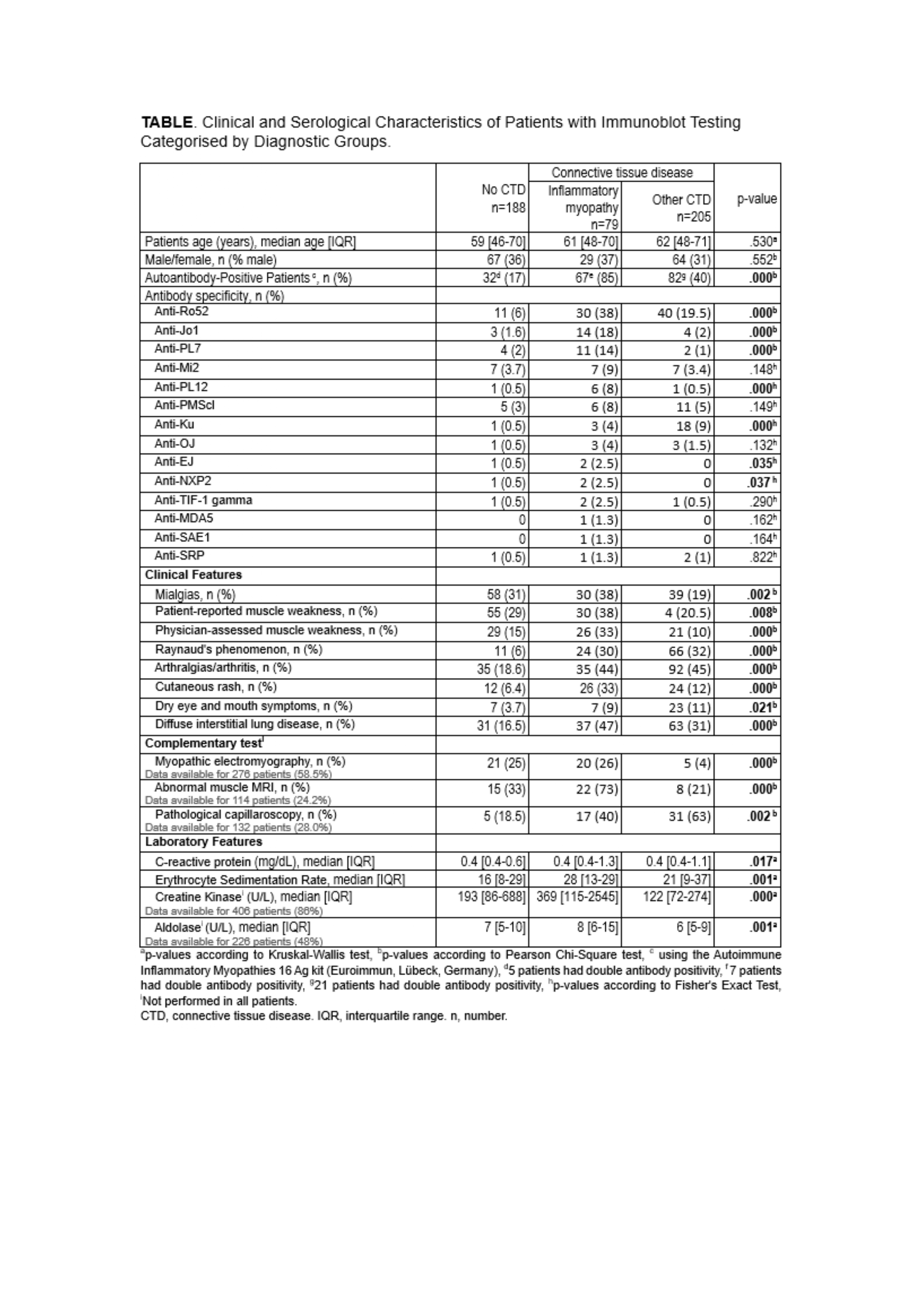Session Information
Date: Tuesday, October 28, 2025
Title: (2052–2078) Muscle Biology, Myositis & Myopathies – Basic & Clinical Science Poster III
Session Type: Poster Session C
Session Time: 10:30AM-12:30PM
Background/Purpose: Idiopathic inflammatory myopathies (IIM) are a heterogeneous group of autoimmune diseases characterized by muscle inflammation and systemic involvement, often associated with specific autoantibodies. Immunoblot assays provide a simultaneous detection of multiple autoantibodies, yet the clinical implications of their positivity, particularly in the context of inflammatory myopathies and connective tissue diseases (CTD), remain incompletely understood.Objective: To characterise the clinical and laboratory features of patients who underwent myositis immunoblot testing, with focus on the prevalence and distribution of autoantibody positivity across IIM and other CTDs.
Methods: Retrospective study with all patients who underwent immunoblot testing for myositis-specific and associated autoantibodies using the Autoimmune Inflammatory Myopathies 16 Ag kit (Euroimmun, Lübeck, Germany) between November 2017 and October 2023 at a single hospital in northern Spain. For patients with multiple tests, only the first result was considered. Patients were categorised into three diagnostic groups: no connective tissue disease (No CTD), inflammatory myopathies, and other CTDs, based on established international classification criteria. Data collection encompassed clinical symptoms, laboratory findings, and complementary tests; however, some tests were not performed in all patients. Missing data were excluded from the analysis.
Results: A total of 472 patients (66% female; median age 61 years [IQR: 47–71]) were included, with 181 (38%) testing positive for at least one autoantibody. Among these, 33 patients (7%) exhibited double antibody positivity, most frequently involving anti-Ro52 (26/33). Patients were categorised into three groups: no connective tissue disease (No CTD) (188; 40%), inflammatory myopathies (79; 17%), and other CTDs (205; 43%).Significant differences in autoantibody specificity were observed across the diagnostic groups. Anti-Ro52, anti-Jo1, anti-PL7, anti-EJ, and anti-NXP2 were more frequently detected in patients with inflammatory myopathies, while anti-Ku was predominantly associated with other CTDs (p< 0.001). Muscle-related symptoms, such as myalgia (38%) and muscle weakness (33%), were significantly more prevalent in inflammatory myopathies compared to patients with other CTDs or no CTD (p< 0.001). Systemic features were also notably distinct: Raynaud’s phenomenon (30%), arthralgia/arthritis (44%), and cutaneous rash (33%) were more common in inflammatory myopathies, while diffuse interstitial lung disease was observed in 47% of these patients (p< 0.001). Table 1 summarizes these findings, along with additional data on complementary tests and laboratory features.
Conclusion: This study underscores the clinical and laboratory differences across diagnostic groups in patients undergoing myositis immunoblot testing. The unexpected prevalence of myopathic findings in patients without CTDs suggests the need for cautious interpretation and potential longitudinal evaluation. Complementary tests remain valuable tools in identifying muscular and vascular abnormalities, supporting a comprehensive diagnostic approach for autoimmune diseases.
 TABLE. Clinical and Serological Characteristics of Patients with Immunoblot Testing
TABLE. Clinical and Serological Characteristics of Patients with Immunoblot Testing
Categorized by Diagnostic Groups.
To cite this abstract in AMA style:
Benavides Villanueva F, Gabrie-Rodriguez L, Secada-Gómez C, Garcia M, Ulloa-Alvarado H, Boselli G, Veloza-Morales C, Irure-Ventura j, López-Hoyos M, Prieto-Peña D, Blanco R. Autoantibody Patterns in Myositis Immunoblot Testing: A Retrospective Study inInflammatory Myopathies and Connective Tissue Diseases (2017–2023) [abstract]. Arthritis Rheumatol. 2025; 77 (suppl 9). https://acrabstracts.org/abstract/autoantibody-patterns-in-myositis-immunoblot-testing-a-retrospective-study-ininflammatory-myopathies-and-connective-tissue-diseases-2017-2023/. Accessed .« Back to ACR Convergence 2025
ACR Meeting Abstracts - https://acrabstracts.org/abstract/autoantibody-patterns-in-myositis-immunoblot-testing-a-retrospective-study-ininflammatory-myopathies-and-connective-tissue-diseases-2017-2023/
